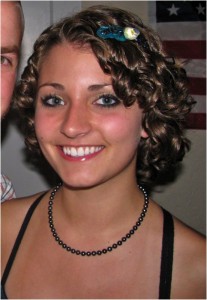
Rachel Bouchillon
Rachel Bouchillon, a master’s student earning her degree in interdisciplinary ecology at the University of Florida, said her dream is to work for the National Oceanic and Atmospheric Association one day.
Starting in August, her dream will become reality. Bouchillon was recently one of six fellows chosen from across the country for the NOAA Coastal Management Fellowship.
The two-year fellowship is intended to provide on-the-job education and training opportunities in coastal resource management and policy for postgraduate students, and to provide project assistance to state coastal zone management programs.
The program matches post-graduate students with specific coastal zone programs, which are proposed by the state and selected by a fellowship sponsor.
After she graduates at the end of the summer, the 23 year old from Bartow, Fla. will be flying 12 hours across the Pacific Ocean to spend two years in the Commonwealth of the Northern Mariana Islands, helping to develop decision support tools for enhanced management of shoreline properties.
Bouchillon, who also competes at the international level in target archery, admitted she cried when she found out the news.
“Choosing to move to such a faraway and remote location isn’t a decision to be taken lightly, and my parents were especially sad at the thought of me being on the other side of the globe for two years,” Bouchillon said. “I’ve lived in Florida for essentially my whole life and am not usually one to take risks, so this really is the opportunity of a lifetime for me. I’m proud of myself for taking the leap. I have no doubt that it’s going to pay off, both personally and professionally.”
Bouchillon said her work with the fellowship will be different from her master’s work in fisheries which she is used to. Her master’s thesis focused on modeling oyster growth along the Big Bend region of Florida. But she believes her work with oystermen and state policymakers will come in handy on the new job.
“The time I’ve spent working with stakeholders has really highlighted the importance of building relationships and involving diverse groups of people in the management process,” Bouchillon said. “This kind of interpersonal engagement is apparently a critical part of getting things done on Saipan, the main island I’ll be living on.”
Peter Frederick, a research professor at the University of Florida who worked with Bouchillon on an oyster restoration project, said she displays all the signs of a promising young scientist.
“Her attitude is well-rounded,” Frederick said. “She has an eagerness to learn, interest and ability to rapidly take on new skill sets, plenty of drive, and a well-developed curiosity about the natural and regulatory world. She is well spoken, good natured and people enjoy being around her.”
After winding down from an application process that she described as similar to a reality TV show, Bouchillon, who also received her bachelor’s degree in environmental science from the University of Florida, offered advice for future applicants.
“Make sure your personal statement is one of the strongest, if not the strongest, components of your application packet. It’s ultimately how the project mentors will start to form their first impression of you going into the matching workshop,” she said.
“This fellowship is just as much about finding the right mentor/mentee fit for you as it is about the projects themselves.”



